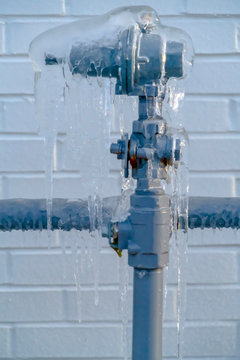Prevent Frozen Pipes in Cold Weather: Professional Advice
Prevent Frozen Pipes in Cold Weather: Professional Advice
Blog Article
The article author is making a few great pointers related to How To Avoid Freezing Pipes overall in this post in the next paragraphs.

Cold weather can damage your pipes, especially by freezing pipelines. Below's how to avoid it from happening and what to do if it does.
Introduction
As temperature levels decline, the risk of frozen pipes boosts, possibly bring about costly repair work and water damages. Recognizing how to avoid frozen pipelines is important for property owners in cold environments.
Comprehending Icy Pipes
What creates pipelines to ice up?
Pipelines freeze when revealed to temperature levels below 32 ° F (0 ° C) for prolonged durations. As water inside the pipes ices up, it expands, putting pressure on the pipe walls and potentially creating them to rupture.
Risks and problems
Frozen pipelines can cause water system disruptions, residential or commercial property damages, and expensive fixings. Burst pipes can flooding homes and cause substantial architectural damage.
Indications of Frozen Piping
Identifying frozen pipelines early can stop them from breaking.
How to determine frozen pipelines
Try to find lowered water circulation from taps, unusual odors or noises from pipes, and noticeable frost on revealed pipes.
Prevention Tips
Insulating vulnerable pipes
Cover pipelines in insulation sleeves or use heat tape to safeguard them from freezing temperatures. Concentrate on pipes in unheated or external locations of the home.
Home heating techniques
Keep interior rooms properly warmed, specifically locations with pipes. Open cupboard doors to permit warm air to circulate around pipes under sinks.
Securing Outdoor Plumbing
Yard hoses and outdoor taps
Detach and drain garden hoses prior to winter season. Install frost-proof faucets or cover outdoor taps with insulated caps.
What to Do If Your Pipelines Freeze
Immediate actions to take
If you presume icy pipelines, keep taps open to relieve stress as the ice melts. Utilize a hairdryer or towels taken in hot water to thaw pipes slowly.
Long-Term Solutions
Structural modifications
Take into consideration rerouting pipelines away from exterior wall surfaces or unheated locations. Include extra insulation to attic rooms, cellars, and crawl spaces.
Updating insulation
Buy high-quality insulation for pipelines, attic rooms, and wall surfaces. Appropriate insulation helps preserve constant temperatures and reduces the risk of frozen pipelines.
Verdict
Preventing icy pipelines needs positive steps and quick actions. By recognizing the reasons, indications, and safety nets, homeowners can protect their pipes throughout cold weather.
Helpful Tips to Prevent Frozen Pipes this Winter
UNDERSTANDING THE BASICS: WHY PIPES FREEZE AND WHY IT’S A PROBLEM
Water freezing inside pipes is common during the winter months, but understanding why pipes freeze, and the potential problems it can cause is crucial in preventing such incidents. This section will delve into the basics of why pipes freeze and the associated problems that may arise.
THE SCIENCE BEHIND FROZEN PIPES
When water reaches freezing temperatures, it undergoes a physical transformation and solidifies into ice. This expansion of water as it freezes is the primary reason pipes can burst. As the water inside the pipe freezes, it expands, creating immense pressure on the walls. If the pressure becomes too great, the pipe can crack or rupture, leading to leaks and water damage.
FACTORS THAT CONTRIBUTE TO PIPE FREEZING
Low Temperatures: Extremely cold weather, especially below freezing, increases the risk of pipes freezing. Uninsulated or Poorly Insulated Pipes: Pipes located in unheated areas, such as basements, crawl spaces, or attics, are more prone to freezing. Insufficient insulation or lack of insulation altogether exacerbates the problem. Exterior Wall Exposure: Pipes running along exterior walls are susceptible to freezing as they encounter colder temperatures outside. Lack of Heating or Temperature Regulation: Inadequate heating or inconsistent temperature control in your home can contribute to frozen pipes. PROBLEMS CAUSED BY FROZEN PIPES
- Pipe Bursting: As mentioned earlier, the expansion of water as it freezes can cause pipes to burst, resulting in significant water damage.
- Water Damage: When pipes burst, it can lead to flooding and water damage to your property, including walls, ceilings, flooring, and personal belongings.
- Structural Damage: Prolonged exposure to water from burst pipes can compromise the structural integrity of your home, leading to costly repairs.
- Mold and Mildew Growth: Excess moisture from water damage can create a favorable environment for mold and mildew growth, posing health risks to occupants.
- Disrupted Water Supply: Frozen pipes can also result in a complete or partial loss of water supply until the issue is resolved.
WHY CERTAIN PIPES ARE MORE PRONE TO FREEZING
- Location: Pipes located in unheated or poorly insulated areas, such as basements, crawl spaces, attics, or exterior walls, are at higher risk of freezing.
- Exterior Pipes: Outdoor pipes, such as those used for irrigation or exposed plumbing, are particularly vulnerable to freezing as they are directly exposed to the elements.
- Supply Lines: Pipes that carry water from the main water supply into your home, including the main water line, are critical to protect as freezing in these lines can affect your entire plumbing system.
- Underground Pipes: Pipes buried underground, such as those connected to sprinkler systems or outdoor faucets, can be susceptible to freezing if not properly insulated.
https://busybusy.com/blog/helpful-tips-to-prevent-frozen-pipes-this-winter/
:strip_icc()/snow-outdoor-faucet-pipes-4af65d1e5e904fb1aa7bf74071fe5d89.jpg)
We were introduced to that write-up about Helpful Tips to Prevent Frozen Pipes this Winter from a buddy on our other website. Sharing is good. Who knows, you may just be helping someone out. Thank-you for taking the time to read it.
Click Here Report this page